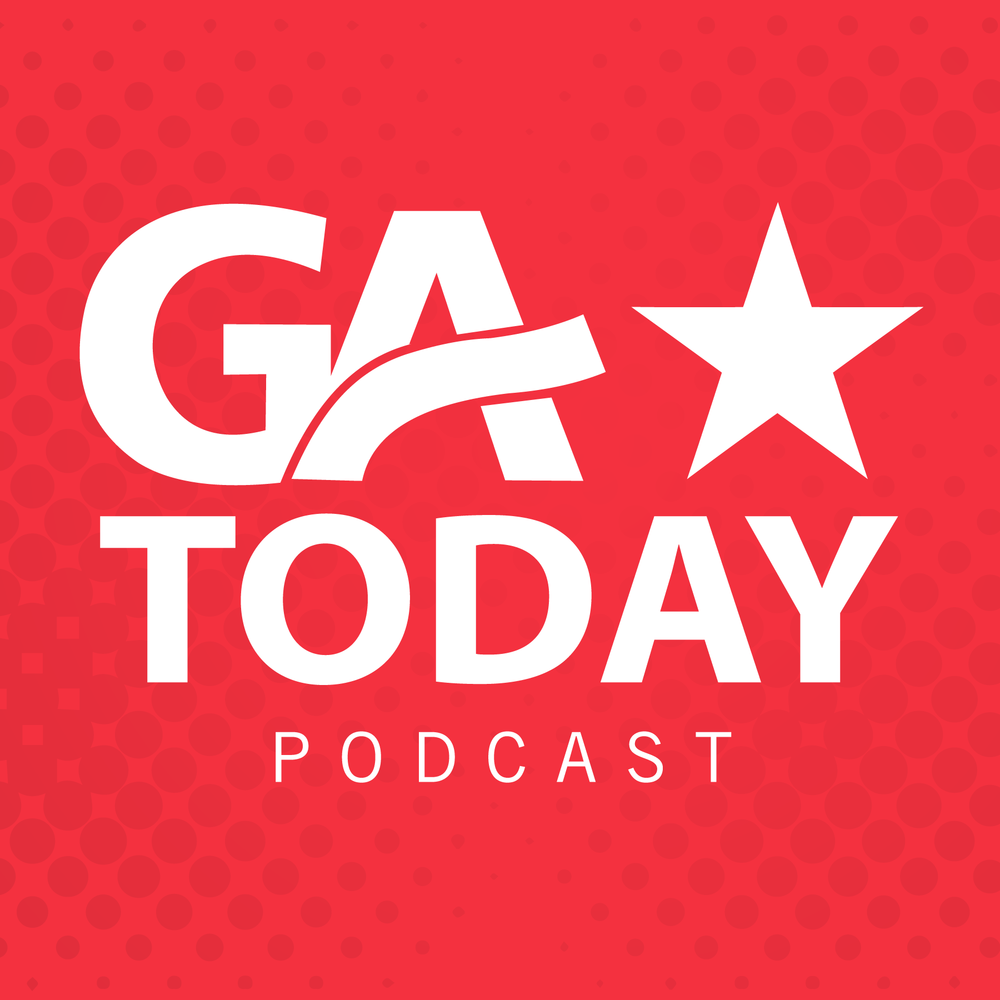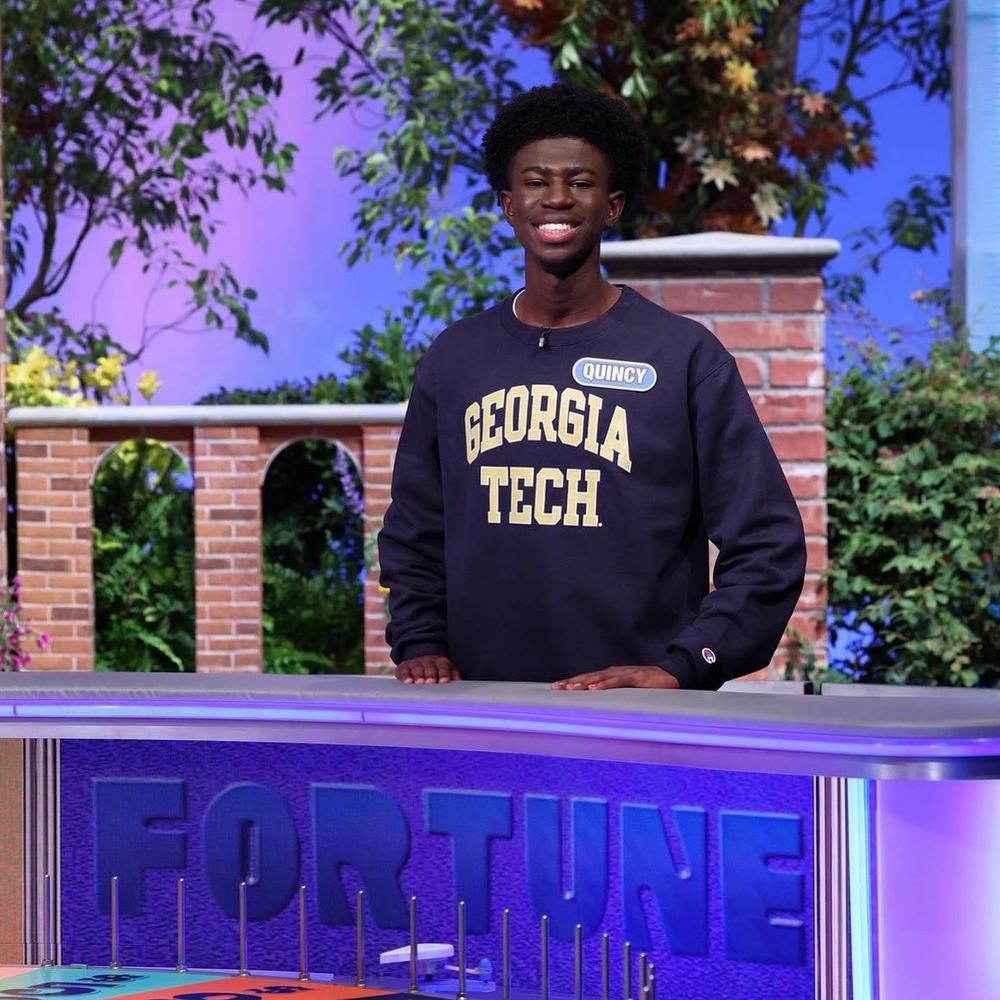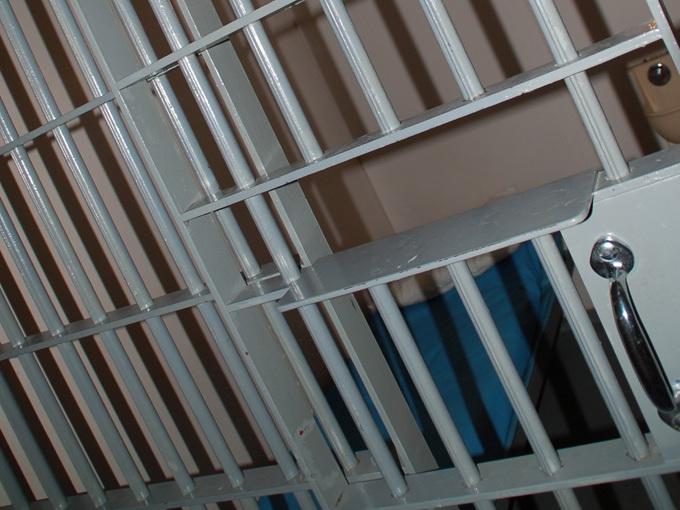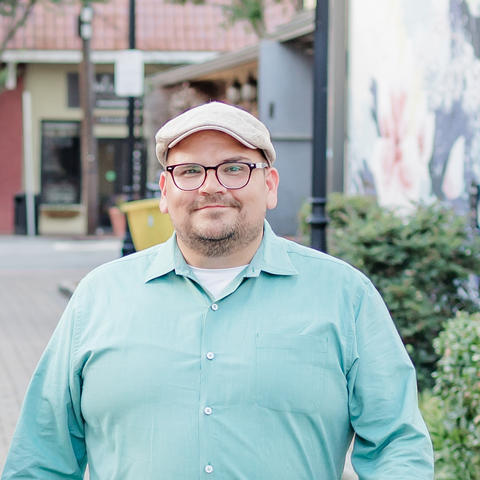
Section Branding
Header Content
Georgia Today: An Augusta hospital merger, a Wheel of Fortune winner, a Savannah singing TikTok star
Primary Content
LISTEN: On the Tuesday Jan. 3 edition of Georgia Today: A big hospital merger is in the works for Augusta; A Georgia Tech sophomore shares his winning experience on Wheel of Fortune; and Savannah has a singing TikTok star

Peter Biello: Welcome to the new Georgia Today podcast from GPB News. Today is Tuesday, Jan. 3, 2023. I'm Peter Biello. Coming up on today's episode, a big hospital merger is in the works for Augusta; a sophomore from Georgia Tech won big on Wheel of Fortune; and we'll continue our look back at our newsroom's most popular stories of the past year. Today, we'll hear how TikTok is putting a spotlight on Forsyth Park in Savannah. These stories and more are coming up on Georgia Today.
Story 1
Peter Biello: Augusta University Health System says it has signed a letter of intent to join Marietta-based nonprofit Wellstar Health System. In a release, the university says aspects of the proposed partnership are still being worked out. Spokespersons could not answer key questions, including how much Wellstar might pay to take over the system's hospitals. The Board of Regents, which oversees Georgia's 26 public colleges and universities, would have to approve any final agreement. A review also would be required by Georgia Attorney General Chris Carr and is subject to a public hearing. The Federal Trade Commission also reviews hospital mergers.

Story 2
Peter Biello: Quincy Howard is a sophomore from Georgia Tech, and he recently won big on Wheel of Fortune. GPB Leah Fleming sat down with the Dublin native to talk about his experience.
Leah Fleming: Now I am a fan of Wheel of Fortune. This is the classic TV show, the game show that's seen in the evenings. Now, recently, there was a winner from Georgia, Dublin native and Georgia Tech sophomore Quincy Howard won "Wheel of Fortune" during the big game shows College Week series. He quickly solve puzzles like "alphabetical order of French fries" before going into the bonus round with $35,000. He quickly solved his bonus round puzzle category.
Pat Sajak: 10 seconds. Good luck.
Quincy Howard: Kids at play.
Pat Sajak: That is it. Curious about this at all? Would you like a Mini Cooper?
Quincy Howard: Wow.
Leah Fleming: Host Pat Sajak then revealed the prize and it was — drumroll — a Mini Cooper, which brung Howard's total winnings to $69,000. Quincy Howard is in the studio right now. Hey, Quincy.
Quincy Howard: Hey.
Leah Fleming: So, first of all, let's talk about that moment. That moment: What was it like for you to experience it?
Quincy Howard: I guess like from start to finish, I applied like pretty much early January. So from there I just, you know, was actually watching the College Week episode. And I just figured like, you know, "Let's give this a shot. I've been watching this for a really long time." I had the game like on my little 3D ass as a child and things like that. So I just figured it would be fun to apply, you know, take the chance. And from there, I applied. And then in the summer they reached back out to me and I was like, well, how?" Like, they actually, you know, emailed me back and then I had to do a virtual audition. So I did the virtual audition. And then about two weeks from there is when I got the call to be a contestant. And it was like kind of right around school time starting. And so I was like, "OK, I got to make sure I'm practicing" and like, you know, ready to go. And then eventually I got there and I just got to experience and talk to other college students, which was pretty fun. And then next thing you know, I was winning the car and solving puzzles.
Leah Fleming: Very cool. So as you and I were talking about a little bit a while ago, when you are actually doing it at home, you know, for those of us who are like fans of it, who enjoy it, we're watching along and we're solving the puzzle before, you know, the contestant does, we think. It's very different than being in the studio doing it, isn't it?
Quincy Howard: It definitely is. Just like the atmosphere itself puts you in a different mindset. Like, I was seeing cue cards and just like seeing Pat Sajak, like get ready to, you know, make sure he speaks and everything goes well and just seeing like the cameras, the lights — like, all those things are a big influence. But as long as you keep your mind like on the puzzle board, it's not that big of a difference.
Leah Fleming: Yeah. You are an industrial engineering student at Georgia Tech. And I'm wondering: Did that help you at all as you were preparing for this?
Quincy Howard: Yes, I would say that also helped me. Just being a student in general helped me knowing how to balance. And, you know, as far as some of the actual industrial engineering standpoint, we work a lot with data and numbers. So I did like kind of do my research on like, you know, "what letters are the best to choose on the board?" like even for like the bonus round and then knowing like little statistical facts like, you know, there's a 15% chance on the wheel that you can lose your turn and things like that, like that kind of helped me to make decisions with the wheel and like just making sure I made good decisions, calling my letters and then spinning.
Leah Fleming: Calling your letters. So when you are calling your letters, you're not just winging it. You're trying to really, you know.
Quincy Howard: Get a feel.
Leah Fleming: Oh, okay. All right. Because I'm wondering, what is that like? Because at home, you know, on the couch with a bowl of popcorn, you know, it's like, oh, I'll throw out this letter.
Quincy Howard: Yeah. So they do. They do also give you, like a board, like on the side — that you don't see on the screen, obviously — that has like, the letters. So you just like, know what's going on, know what's called. So you can kind of use that for reference. And then just knowing, like, I said, the popular letters, like the R-S-T-L-N-E, those are the most popular letters and then just seem like small parts of words like and knowing like, okay, "If this is a T and this is a three-letter word, like, that's probably D, and then you call out the H" and then like just go from there and hope that you have more letters from a letter that you call that you know.
Leah Fleming: Oh, okay. Okay. So there is a method to this.
Quincy Howard: So that's that's kind of how I kind of broke it down to myself and that I tried to go from there. And that really I think I don't think I called like one round letter. So like that method really helped me in the end as far as just like not losing my turn.
Leah Fleming: Keep that in mind. For all of the future contestants, keep that strategy in mind. I like that. Did Georgia Tech have a watch party? Did they do watch parties?
Quincy Howard: Yes. So I did have one with my friends on campus. So it was pretty cool to like, you know, see their reactions. And I was just kind of like standing up the whole time, basically, like them, because I also didn't know, like, you know, how my facial expressions looked and things like that. So it was like still pretty much the same for me, even though I knew the outcome, you know?
Leah Fleming: Oh, right, right. Because it was prerecorded in August and then, you know, the episode aired much later. So you were able to be at the watch party?
Mm hmm, yes.
And you knew what was going to happen?
Yeah.
Now, do you have to sign an agreement that you won't talk about it?
Quincy Howard: Yes. So I did sign, like, documents, you know, and the biggest thing is not spoiling it. So I did make sure, lik — you know, because my sister was also there and my sister, like 13 years old. So I'm like, "Do not say anything!" And like my parents to just like, you know, "keep it down on the low," things like that. So that was pretty cool to experience that with them. And then yeah, we just had to make sure we didn't say anything. So everybody had like, you know, good genuine reactions and got to see for themselves.
Leah Fleming: Yeah, I can imagine your sister running around Dublin like trying — and your mother —!
Quincy Howard: Yes! I was about to say it would probably be my mom the most.
Leah Fleming: Well, what an exciting time. I mean, is there anything that you are thinking about in terms of your future? Will you go on more game shows perhaps?
Quincy Howard: I actually do like really love game shows, competition shows. So another one of my favorite shows is like a competition competition show called The Amazing Race.
Leah Fleming: Oh, yeah.
Quincy Howard: And they go like around the world and travel and they do more like scavenger-hunt type things. I like things like that. That's like a really cool show to me. And then I don't know if I could do Jeopardy, but maybe if I practiced enough like it. You know, I've got the got the methods down, maybe Jeopardy. But that's that's on a different level of, like, genius. So I might have to.
Leah Fleming: That's a whole 'nother level.
Quincy Howard: Yeah, I might have to leave that one alone.
Leah Fleming: Because, you know, Jeopardy follows for — for most of us at least watching in Georgia — Jeopardy follows Wheel of Fortune. And you're right. You're right. That's a whole 'nother level. Oh, what an exciting time in your life.
Quincy Howard: Yes, very, very memorable moment.
Leah Fleming: Thank you so much. Quincy Howard, you are a student at Georgia Tech and you are from Dublin. Thank you so much for coming in.
Quincy Howard: Yes, ma'am, thank you.

Story 3
Peter Biello: A lack of access to behavioral health care leads some Georgians to desperation and many wind up in jail for nonviolent crimes. And that's where their symptoms can get worse. Unfortunately, court-ordered programs are sometimes the only way to get help. GPB's Ellen Eldridge reports.
Ellen Eldridge: Nova Jaswan would like to stop using cocaine and she'd like help with some of the other issues that feed into why she uses cocaine.
Nova Jaswan: I'm schizoaffective, I have PTSD and I have mood disorder NOS
Ellen Eldridge: N-O-S is?
Nova Jaswan: Not Otherwise Specified. And I have autism nonverbal learning disorder.
Ellen Eldridge: But she has no health insurance, income or transportation, not even a state ID. The only place she's been able to get any psychiatric care is in jail or prison. She says she left her son with family because she didn't want him to find out his mother was an embarrassment.
Nova Jaswan: So I said, "Well, I'd rather be a jailbird than a street rat, and I'd rather be in prison than doing drugs on the street."
Ellen Eldridge: Fulton County Jail is Georgia's largest de facto mental health facility, its accountability court says. One third of the people locked up in Fulton County Jail are on psychotropic medication and 75% test positive for illegal drugs shortly after arrest. But the court system is often the best way to get a referral for behavioral health treatment. Jaswan struggled with the first court-ordered program, and when she left treatment early, she got locked up again.
Nova Jaswan: Yes, I did it on purpose. Criminal damage to property. I didn't want to hurt anybody, so —
Ellen Eldridge: And so what — what does that mean? What did you do?
Nova Jaswan: I broke windows as big as about a door at a company.
Ellen Eldridge: Okay.
Nova Jaswan: I didn't hurt anyone, thank God.
Ellen Eldridge: But she's done this same crime seven times, landing repeatedly in the Fulton County Jail. That's despite knowing just how bad the conditions in the jail were. Jaswan is one of the plaintiffs in a civil action lawsuit filed against the former sheriff and others involved with jail conditions. The Georgia Advocacy Office and the Southern Center for Human Rights partnered to bring the case. The suit alleged many women with mental illness had deteriorated psychologically while held in solitary confinement in the jail's South Annex. The case was settled earlier this year. Devin Orland is the legal director of the Georgia Advocacy Office. She says the settlement calls for better mental health treatment.
Devin Orland: Providing them with recreation time. Providing them with therapeutic interventions. With clothing. The opportunity to bathe. Non spoiled food. Some pretty basic stuff.
Ellen Eldridge: But having a psychiatric disability is not a precursor to crime, Orlean says. And the jail can't force folks to take pills if they refuse. Orland says what has been going on in the Fulton's jail is a microcosm of what is happening in society, and the solution is a better safety net for behavioral health issues.
Devin Orland: We can reduce the pressure and the strain on the jails by having a meaningful community-based mental health system.
Ellen Eldridge: Cobb County's sheriff agrees and says many of the detainees would not be jailed if they had had access to quality mental health services. That's why last November they added a full-time psychiatrists and nurses trained in behavioral health to the detention center staff. Cobb's jail is the first in the state to do so. Sheriff Craig Owens said in a statement last year that, quote, "From intake to discharge, We are committed to getting our detainees the help they need so they never have to walk back through our doors again." But until Georgia has more support for those with the least access to care, jails will likely remain the largest mental health facility in the state. For GPB News, I'm Ellen Eldridge.

Story 4
Peter Biello: Viral memes, funny cat videos, Gen Z dancers, autotune remixes. These are just some of the things that might come to mind when you think of TikTok. But the popular video app is also transporting viewers to Forsyth Park in Savannah, specifically to a new vendor of sorts at the farmer's market. GPB's Benjamin Payne explains.
Benjamin Payne: If you've ever been to Forsyth Park, chances are you've been to the fountain. It's a familiar sight and a familiar sound, having drawn in visitors to the north side of Forsyth for a long time — more than 160 years. But over on the park's south side, there's a much newer sound in town, and you don't even have to be physically there to hear it.
(Clara Waidley singing)
Benjamin Payne: That's Clara Waidley streaming live on TikTok. The 25-year-old singer songwriter has taken to storm on the popular video platform.
Clara Waidley: I would say I've had up to 5,000 people on a livestream before and then, you know, as little as 100 sometimes. But it's it's always great no matter what.
Benjamin Payne: Some of those viewers will open TikTok just to hear Waidley, but many others will discover her sort of by accident. In fact, that was the case with me. One Saturday morning, I was on TikTok getting my usual fix of cat videos. Then all of a sudden the app's algorithm recommended I take a break from the fur babies and instead watch Waidley.
Clara Waidley: (singing)
Clara Waidley: Just the support from everyone on TikTok has been so, so awesome and really encouraging for me. It's been a way for me to reach more people that also enjoy my music.
Benjamin Payne: It's also been a way to build up her confidence as a performer.
Clara Waidley: I feel like it helps me sometimes with some performance things. I feel like, "OK, there's there's more than just the people around me right now that are watching." So I want to make sure I look like I know what I'm doing.
Benjamin Payne: All the online exposure has led to some offline opportunities as well.
Clara Waidley: Show-wise, you know, like, people invite. I played like a few weddings because of TikTok. I've met the people who have helped me record my album that's coming up. TikTok has been a part of that. So just really, it kind of broadens the opportunities I have.
Clara Waidley: (singing) the skies are blue / You can always find your way / the skies are blue.
Benjamin Payne: Most of Waidley's live streams take place at the Forsyth Park Farmers Market, so at the same time she's livestreaming to the masses online, she's also busking for whoever happens to walk by — or toddle by. The morning I went, a little boy had a lot of words for the lady with the guitar.
Clara Waidley: Yeah, yeah, yeah. It's a microphone.
Benjamin Payne: His mom tried to keep the train moving.
Mom: Come on, we'll go get [someone's name] and then we'll come back and listen to her sing some more music. How about that? OK?
Benjamin Payne: But the boy stayed put and he put in a request to Waidley: play a song about dinosaurs.
Clara Waidley: Oh, I gotta learn a dinosaur song. All right. I guess that will be on my list of songs to learn.
Benjamin Payne: In the meantime, he'll have to settle for a song Waidley wrote called "Summer Forever."
Clara Waidley: (singing) Now I'll bet you'll listen while you drive / probably wishing she was sitting right by your side.
Benjamin Payne: For GPB News, I'm Benjamin Payne at Forsyth Park in Savannah.
Clara Waidley: (singing) Hands out the window and making 'em fly. She's kind of like a weapon. She'll leave your skin warm and freckled if you let her....
Peter Biello: And that is it for today's edition of Georgia Today. If this is your first time listening to the podcast, first of all, welcome. Really appreciate you being here. Don't forget to subscribe to this podcast. That way, a new edition will appear automatically in your podcast feed every weekday afternoon. That way, you'll always be caught up on the top stories from the GPB newsroom. By the way, if you want to read more about any of these stories, see some of the associated photos: You can always find the story at GPB.org/News. Your feedback is appreciated as well. You can send it to us by email. The address is GeorgiaToday@GPB.org.
I'm Peter Biello. Thanks again for listening. We'll see you tomorrow.



